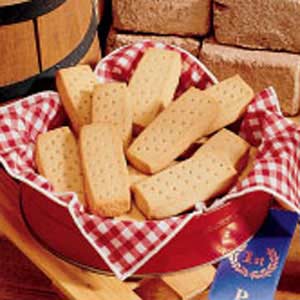Today’s special recipe comes from Ana Díaz Negrillo, professor of the Department of English and German, and it is a Scottish Shortbread. It brings a very informative introducction so we can learn a little bit about Scotland’s culture and history. What are you waiting? Keep on reading!

Scottish cookery has always differed from culinary endeavours south of the Border. The Romans influenced English cooking but as they did not venture far into Scotland, historically Scottish cuisine developed slowly. Scottish cooking methods advanced through the influence of the French at the court of Mary Queen of Scots and later through the elaborate dishes served to English lords with Scottish estates. Queen Victoria and Prince Albert acquired Balmoral in the 19th century and whilst they brought with them the rich food of the English court, they also liked to serve traditional Scottish dishes to important visitors.
Scottish cooks have always been famous for their soups, haggis (a dish traditionally served on Burns Night) and their baking, especially scones, pancakes, fruit cakes, oatcakes and shortbread.
The story of shortbread begins with the medieval «biscuit bread». Any leftover dough from bread making was dried out in a low oven until it hardened into a type of rusk: the word «biscuit» means «twice cooked». Gradually the yeast in the bread was replaced by butter, and biscuit bread developed into shortbread.
Shortbread was an expensive luxury and for ordinary people, shortbread was a special treat reserved just for special occasions such as weddings, Christmas and New Year. In Shetland it was traditional to break a decorated shortbread cake over the head of a new bride on the threshold of her new home. The custom of eating shortbread at New Year has its origins in the ancient pagan Yule Cakes which symbolised the sun. In Scotland it is still traditionally offered to «first footers» at New Year.
Shortbread has been attributed to Mary, Queen of Scots, who in the mid-16th century was said to be very fond of Petticoat Tails, a thin, crisp, buttery shortbread originally flavoured with caraway seeds.
There are two theories regarding the name of these biscuits. It has been suggested that the name «petticoat tail» may be a corruption of the French petites gatelles («little cakes»).
However these traditional Scottish shortbread biscuits may in fact date back beyond the 12th century. The triangles fit together into a circle and echo the shape of the pieces of fabric used to make a full-gored petticoat during the reign of Elizabeth I. The theory here is that the name may have come from the word for the pattern which was ‘tally’, and so the biscuits became known as ‘petticoat tallis’.
Shortbread is traditionally formed into one of three shapes: one large circle divided into segments («Petticoat Tails»); individual round biscuits («Shortbread Rounds»); or a thick rectangular slab cut into «fingers».
Ingredients:
- 200g/7oz unsalted butter, at room temperature, cut into small cubes
- 100g/3½oz sugar, plus extra for sprinkling
- 1 tsp vanilla extract
- 300g/10½oz plain flour, sifted, plus extra for dusting
Directions:
- Preheat the oven to 160C/325F/Gas 3.
- Mix together the butter and sugar, either by hand or using an electric hand whisk, until pale and smooth. Add the vanilla extract, then gently mix in the flour until completely incorporated (try not to work the flour too much or the biscuits will not be so crumbly). Using your hands, squeeze the mixture together into a ball of dough.
- Gently roll the dough out to about 5mm/¼in thick (dust the work surface with a little flour if the dough sticks). Cut into shapes using a biscuit cutter. Transfer the biscuits to a baking tray lined with baking parchment (or a non-stick baking tray) and chill in the fridge for 15 minutes to rest (chilling makes them hold their shape better when baking).
- Before cooking, sprinkle each biscuit with a pinch of granulated sugar. Bake in the preheated oven for 15-20 minutes, or until pale golden-brown.
- Remove from the oven and transfer the biscuits to a wire rack to cool.
Enjoy!
Sent by: Ana Díaz Negrillo
Source: http://www.bbc.co.uk/food/recipes/butter_shortbread_74896
Image: http://cookdiary.net/scottish-shortbread/
Editors: C.L.C., E.R.S.